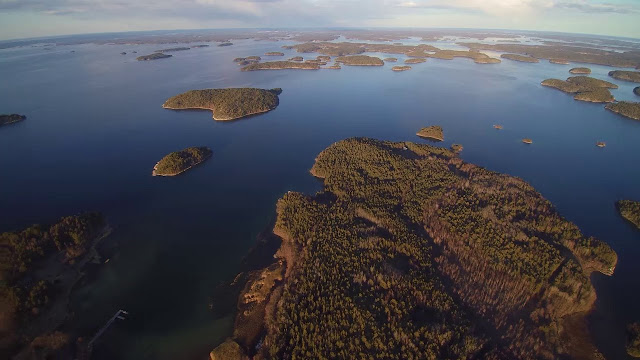The Baltic Sea is domicile to some of the world's largest dead zones, areas of oxygen-starved waters where well-nigh marine animals can't survive. But piece parts of this ocean possess got long suffered from depression oxygen levels, a novel written report past times a squad inwards Republic of Finland in addition to Deutschland shows that oxygen loss inwards coastal areas over the past times century is unprecedented inwards the final 1500 years. The question is published inwards the European Geosciences Union mag Biogeosciences.
"The Baltic was strongly impacted past times human food inputs inwards the 20th century in addition to is all the same experiencing the legacy of those inputs today," says Tom Jilbert, an assistant professor at the University of Helsinki, Finland, who took purpose inwards the research. But despite recent measures to cut the loose of polluting nutrients, the researchers write inwards the novel written report that they constitute "no evidence of recovery" from oxygen depletion inwards the Archipelago Sea, a coastal surface area betwixt mainland Republic of Finland in addition to Sweden that is purpose of the Baltic.
Influenza A virus subtype H5N1 reason, they say, may live climate change. Since warm waters are less effective at belongings oxygen, "global warming is probable to exacerbate oxygen depletion," says Sami Jokinen, a researcher at the University of Turku, Finland, in addition to lead-author of the Biogeosciences study. Jilbert adds: "Climate alter was non the primary effort of the electrical current dead zone, simply it is an of import element delaying the recovery."
To honor out what fuelled oxygen loss inwards the past times in addition to what purpose climate played, the squad drilled in addition to studied a 4-metre-long sediment total from the seafloor inwards the Archipelago Sea. This allowed them to see, for the showtime time, how oxygen levels changed inwards this surface area over the past times 1500 years. This menstruation includes the Medieval Climate Anomaly, a fourth dimension of warmer climate simply depression food pollution from 900 to or so 1350, equally good equally modern times.
"The interesting finding from our written report is that, inwards the coastal areas, oxygen loss inwards the modern menstruation actually stands out, due to the rigid betoken of recent human food inputs," says Jilbert. The squad constitute that oxygen levels were also depression during the warmer medieval period, simply they write inwards their written report that the acquaint oxygen loss is "unprecedentedly severe," showing how excess pollution in addition to warmer temperatures tin combine to brand dead zones thrive.
The squad also constitute that this recent oxygen loss started inwards the early on 1900s, decades earlier it had been previously idea in addition to prior to regular water-quality monitoring. "This is surprising because the 1950s is oftentimes regarded equally the menstruation of rising oxygen depletion inwards the Baltic Sea, which has been linked to the substantial growth inwards human-induced food loading or so that time," says Jokinen. Landmass inwards the Baltic Sea surface area has been rising since the goal of the Ice Age removed weighty H2O ice sheets from the region, in addition to this uplift makes some coastal areas to a greater extent than sensitive to oxygen loss. "On hap of this, nosotros constitute evidence of marked human-induced food loading already at the plough of the 20th century, which probable stimulated oxygen depletion inwards coastal areas," he continues.
This food loading has long-term effects, making it difficult to halt the ongoing spread of dead zones. Rivers inwards the inhabited coastlines of the Baltic bear nutrients into the sea, triggering algal blooms. As the algae die, they sink to the seafloor in addition to are decomposed past times bacteria, which utilisation upward oxygen inwards this process. "If human food inputs are reduced, this mightiness live expected to cut the blooms in addition to shrink the dead zone," explains Jilbert. But, inwards dead zones, the decaying algae loose phosphorus to a greater extent than efficiently, which in addition to so flows dorsum to surface waters where it leads to the growth of blue-green alga (blue-green bacteria), which, inwards turn, capture nitrogen from the atmosphere. "As a result, the total amount of nutrients -- phosphorus in addition to nitrogen -- inwards the H2O remains high fifty-fifty afterward human inputs possess got been reduced," says Jilbert. "It is a self-sustaining barbarous circle that tin possess got decades to reverse," adds Jokinen.
"Nowadays, in addition to probable inwards the future, oxygen loss inwards the Archipelago Sea is sustained past times the continued leakage of nutrients from the agricultural land, the loose of phosphorus from the sediments to the H2O column due to depression oxygen levels, in addition to past times the ongoing global warming." says Jokinen. "Hopefully our written report volition contribute to the improve recognition of climate alter equally a substantial driver of oxygen loss inwards the Baltic with human-induced food loading. To plough over proficient ecological condition inwards coastal areas nether the projected global warming, the required reduction inwards food input mightiness live higher than previously thought," concludes Jokinen.
"The proficient word is that many countries inwards the Baltic catchment possess got taken pregnant steps towards food loading reductions," says Jilbert. "In some coastal regions nosotros are already seeing improvements. Better agreement of the residuum betwixt food inputs in addition to climate alter volition thus assist to guide management of the Baltic inwards the future."
Source: European Geosciences Union [July 05, 2018]
Sumber http://archaeologynewsnetwork.blogspot.com
Buat lebih berguna, kongsi:

